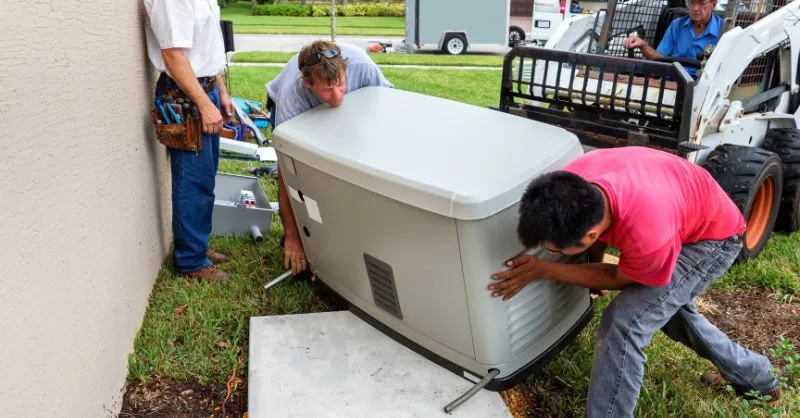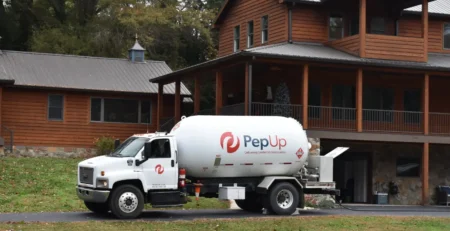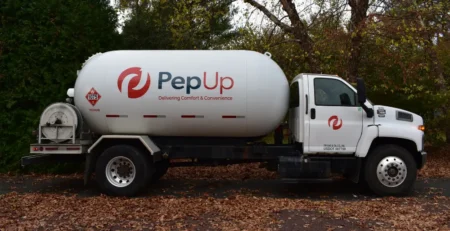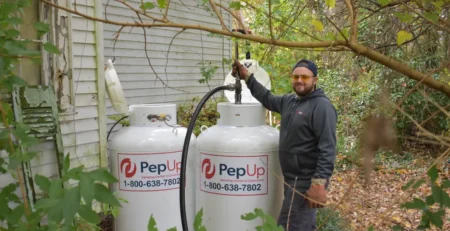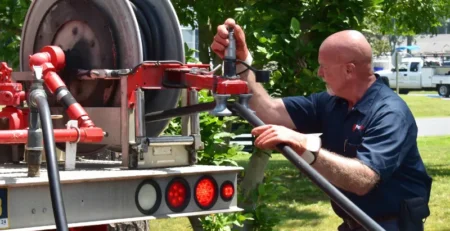A comparison of gasoline-powered and propane generators
In the Mid-Atlantic region, frequent storms and power outages make home generators essential. They ensure continuous electricity for heating, refrigeration, and medical devices, preventing disruptions. Reliable propane generators can significantly enhance safety and comfort, especially during prolonged power outages due to unpredictable weather conditions.
Both portable and whole-home generators can run on a variety of fuels: diesel, gasoline, and propane. Let’s take a closer look at the benefits and challenges of both gasoline-powered and propane generators, so you can select the type of generator that best suits your needs.
How does a generator create electricity?
Generators convert mechanical energy into electrical energy. An engine driven by fuel (such as gasoline, propane, or diesel) turns a rotor, which moves conductors through a magnetic field. This motion induces an electrical current, producing usable electricity to power household appliances and other electrical devices.
What to consider when looking for a backup generator
First, consider whether you’re looking for a whole-home power backup system or a portable generator to power only a few essential items, such as freezers, refrigerators, and a few lights and power outlets. Then, use this checklist to determine what size and type of generator you will consider:
- Power capacity (in watts): Determine the total wattage of essential appliances to ensure adequate power. Consider that many generators list starting watts and running watts. Starting watts cover the initial surge of power needed to start devices; running watts sustain their continuous operation.
- Fuel type (gasoline, propane, diesel): Select what type of generator fuel you’ll use based on availability, storage convenience, and environmental impact.
- Runtime: Check how long a generator can run on a full tank to match potential outage durations. This will help you determine how much fuel you’ll need to store to power your generator for anywhere from a few hours to a week. If you’re considering a propane whole-home automatic backup generator, consider the size of your home’s propane tank, your home’s normal usage, and the generator’s potential usage in an extended-use scenario.
- Noise level: Look for quiet-running models to ensure comfort and comply with local noise regulations. Portable gasoline-powered generators are generally the most noisy. Propane-powered units are quieter. All generators should have a decibel (dB) range in their specifications to help you determine just how loud they may be when in use. Here’s a chart to help you visualize and imagine potential noise levels by decibel.
- Portability: Consider the ease of moving the generator if location flexibility is needed.
- Maintenance and durability: Opt for models known for low-maintenance and long-term reliability. Other than online reviews, consider asking neighbors about their experience with specific generators and manufacturers.
- Cost: Generators can be quite an investment, especially whole-home models that require installation and propane supply line connection. Balance initial investment with long-term operational costs to fit your budget, and consider starting smaller to power fewer things, then upgrading later if cost is a big concern right now.
A closer look at gasoline-powered generators
Gasoline-powered generators offer several pros and cons when compared to propane-powered generators:
Pros:
- Affordability: Typically, gasoline-powered generators can be purchased at a lower initial cost, making them more budget-friendly.
- Fuel Availability: Gasoline is widely available at many locations, ensuring easy refueling even during emergencies, for the most part. It may be a good idea to use ethanol-free gas for longer-term storage of backup fuel, or fuel inside the generator. Consider the availability of ethanol-free gas near your home if you choose to use it, rather than regular unleaded gasoline.
Cons:
- Fuel Storage: Gasoline has a shorter shelf life than propane, degrading over time and risking engine damage due to water separation.
- Environmental Impact: Higher emissions (when compared to propane units) contribute to pollution, making it less eco-friendly than propane.
- Maintenance: Requires regular maintenance to keep the engine running efficiently, adding to potential upkeep costs. Carburetors are likely to gum up if gasoline is left in the generator from one storm season to the next, leading to difficulty starting or not starting at all.
- Safety Concerns: Gasoline is highly flammable, posing storage and handling risks. Storing enough gasoline to run a generator for a week can pose a health and safety risk.
While gasoline-powered generators are cost-effective and offer convenience, their environmental impact, storage limitations, and maintenance needs are significant drawbacks compared to propane-powered options.
Propane generators: Benefits and considerations
Propane generators are the most common whole-home automatic backup generators in our area. The primary reason is that, once they are installed and connected to the home’s propane tank, they operate with almost no interruption in power and very little homeowner action. They are the ultimate generator for convenience and efficiency.
Pros:
- Environmental Friendliness: Propane burns cleaner than gasoline, reducing harmful emissions and environmental impact.
- Fuel Longevity: Propane has an indefinite shelf life, preventing fuel degradation over time.
- Reliability: Permanent propane tanks ensure a stable fuel supply during emergencies, unlike gasoline, which can be in short supply or difficult to store due to shelf life limitations and safety concerns.
- Maintenance: Propane generators often require less frequent maintenance, as propane is a cleaner-burning fuel, potentially reducing engine wear and damage.
Cons:
- Higher Initial Cost: The initial investment for a propane generator and its installation is higher compared to gasoline-powered models.
- Professional Installation: Setting up a propane system typically requires professional installation, adding to the overall cost and complexity.
- Fuel Availability: Refueling propane can be less convenient if a propane delivery service is unavailable or if users cannot transport tanks on their own. This is when a permanent whole-home backup generator really shines. Just make sure your propane tank is sized appropriately to run your generator – in addition to your normal home propane needs – for at least a week.
Despite the higher upfront costs, propane-powered generators offer environmental benefits, long-term fuel stability, and reliability, making them a preferable choice for homeowners prioritizing sustainability and dependable power during emergencies.
Depending on where you live, you may need a permit to install an emergency backup generator. Here’s the regulatory information for the state of Delaware. If you live in Maryland, you’ll need to read this permit document to make sure your generator is covered.
Need help deciding which type of generator you’ll choose, or how you’ll get a permanent generator installed? Give us a call. Our Energy Specialists can help find the answers to all your questions so your family’s emergency power source is ready to go, whenever you need it most.
Frequently Asked Questions (FAQs) About Home Backup Generators
If you’re considering adding a propane-powered home backup generator, you may have questions our technicians can answer.
Here are some of the most common questions our customers have about adding a generator to their home, along with some safety considerations for how a generator is connected to your home to provide power.
Learn more about Generac home backup generators by visiting the company’s FAQ page.
That depends on what appliances you need to power during an outage.
First, list all the appliances you need to power and note their wattage. For example, if your A/C unit requires 2,250 watts, your fridge needs 750 watts, and your sump pump uses 2,000 watts, the total wattage is 5,000 watts. Convert this to kilowatts by dividing by 1,000, resulting in 5kW.
Choose a generator that can produce at least this amount of power continuously. For half-load efficiency, a 10kW generator will cover your 5kW needs. Always consider future appliance additions, and contact PepUp to talk through your needs and propane supply calculations.
Yes, generators do require maintenance to ensure they operate effectively and reliably when you need them most. Regular maintenance* can prolong the life of your generator and prevent costly repairs. Here’s a breakdown of what generator maintenance typically involves:
- Regular Inspection. Conduct routine inspections to check for any visible signs of wear and tear, such as frayed wires, loose connections, or leaks.
- Oil Change. Generators need their oil changed periodically, typically after a set number of operating hours, as specified in the manufacturer’s manual. The oil keeps the engine lubricated and running smoothly.
- Filter Replacement. Oil, air, and fuel filters should be replaced regularly. Dirty or clogged filters can reduce efficiency and lead to engine damage.
- Battery Maintenance. If your generator has a battery, it’s important to ensure it is fully charged and in good condition. Clean terminals and test the battery to prevent any start-up issues.
- Coolant Check. For liquid-cooled generators, inspect coolant levels and top off as necessary. Also, check for proper radiator functioning and any coolant leaks.
- Spark Plug Inspection and Replacement. Spark plugs should be inspected and replaced as needed to ensure reliable engine ignition.
- Check Fuel System. Inspect fuel lines, hoses, and clamps for cracks or damage. Also, regularly check the fuel level and quality, especially if the generator is infrequently used.
- Exercise Your Generator. Run your generator periodically, even if you don’t need it. This helps ensure all components remain in good working order and that the generator is ready to go in an emergency.
- Software and System Updates. For newer models with electronic components, check for any available software or firmware updates from the manufacturer.
- Professional Servicing. Schedule professional servicing at least once a year. A technician can perform comprehensive diagnostic tests and ensure all components are functioning optimally.
*Always refer to the manufacturer’s manual for specific maintenance guidelines, and consider keeping a log of maintenance activities for better tracking and accountability.
Half-load efficiency refers to the performance of a generator when it operates at 50% of its maximum capacity. It is a measure of how efficiently a generator uses fuel to produce electricity at this reduced load level. Running a generator at half load is often more efficient than at full load, as it can consume less fuel per unit of power generated.
This efficiency can vary depending on the generator’s design and technology. Knowing the half-load efficiency helps in planning fuel consumption and cost, ensuring you have adequate resources for power needs during outages or planned use.
The amount of propane a home backup generator uses depends on the generator’s power rating, the load it’s supplying, and its design efficiency. A common example is a 10kW generator running at half load, which typically consumes about 1 gallon of propane per hour.
If you have a different generator size or load, your fuel consumption may vary. For precise calculations, refer to your generator’s specification sheet or consult the manufacturer’s guidelines. Understanding these specifics helps in planning fuel storage for anticipated power outages.
To calculate a generator’s propane consumption per hour, you can use the following formula:
Propane Consumption (gal/hr) = Load (kW)/Generator Efficiency (kW/gal)
Here’s how to use this formula:
- Load (kW): Determine the total power demand in kilowatts (kW) that the generator needs to supply. This is the sum of the wattage of all appliances and devices you’ll be powering, converted to kilowatts (1,000 watts = 1 kW).
- Generator Efficiency (kW/gallon): This is the fuel efficiency at which your generator converts propane to electricity. You can find this information in the generator’s user manual or specification sheet, usually given as the amount of power (in kW) the generator produces per gallon of propane at a specific load.
By plugging in these values, you’ll get an estimate of how much propane your generator will use per hour. Keep in mind that efficiency can vary based on how the generator is loaded (e.g., half load versus full load). Always refer to your generator’s detailed specifications for more accurate calculations.
The best location for a home standby generator is on a level surface, at least 5 feet from your home’s doors, windows, and vents, ensuring proper ventilation and safety. It should be easily accessible for maintenance and near the propane supply line for convenience and reduced installation cost.
Always comply with local codes and manufacturer guidelines. We recommend having your generator professionally installed to ensure the safety of your family, neighbors, and electrical transmission line workers.
A standby generator transfer switch is a critical component that transfers the electrical load from the utility power source to the backup generator during a power outage. It disconnects the home from the utility line to prevent backfeeding.
Backfeeding occurs when electricity flows from a generator or an alternative power source back into the utility power lines. This can happen if a generator is connected directly to a home’s wiring without a proper transfer switch. Backfeeding is hazardous because it can energize power lines, posing a risk to utility workers trying to restore power and potentially damaging electrical equipment.
To prevent backfeeding, it’s essential to use a transfer switch when connecting a generator to a home’s electrical system. Once grid power is restored, the switch safely reverts the load back to the utility source. This ensures a seamless and safe transition of power, protecting appliances and ensuring continuous electricity.
That depends on what size generator you choose, what appliances it will power during an outage, and how long of an outage you want to be prepared for.
Generally, power outages can last from a few hours to several days. Minor outages might be resolved within 1-2 hours, whereas severe storms sometimes lead to outages lasting several days or even weeks in extreme cases. Most people prepare for power outages lasting 72 hours (three days) as a standard benchmark. This allows them to be ready for common short-term disruptions while providing a buffer for longer outages.
Talk to your PepUp technician or an Energy Specialist if you’ll be adding a home backup generator to your propane supply line. We’ll help you determine if your tank is the right size to power your propane generator for 3 days, taking into consideration all of your home’s propane needs and your delivery schedule.
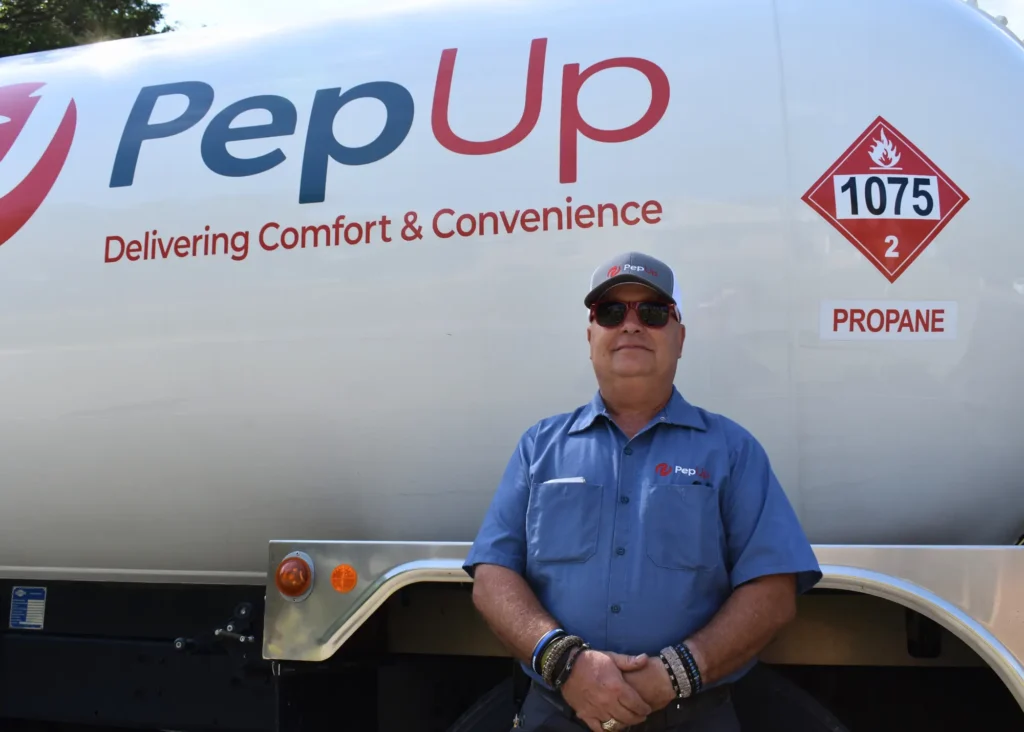
Meet Contributor and PepUp Home Propane Delivery Driver, Patrick Lanahan
Patrick is one of our newer crewmates. He started with PepUp in 2023 as a seasonal tank technician working on our dock. Then, he utilized our tuition reimbursement program to get his CDL with X endorsement, and was promoted to a full time delivery driver. Welcome to the driver team, Patrick!

